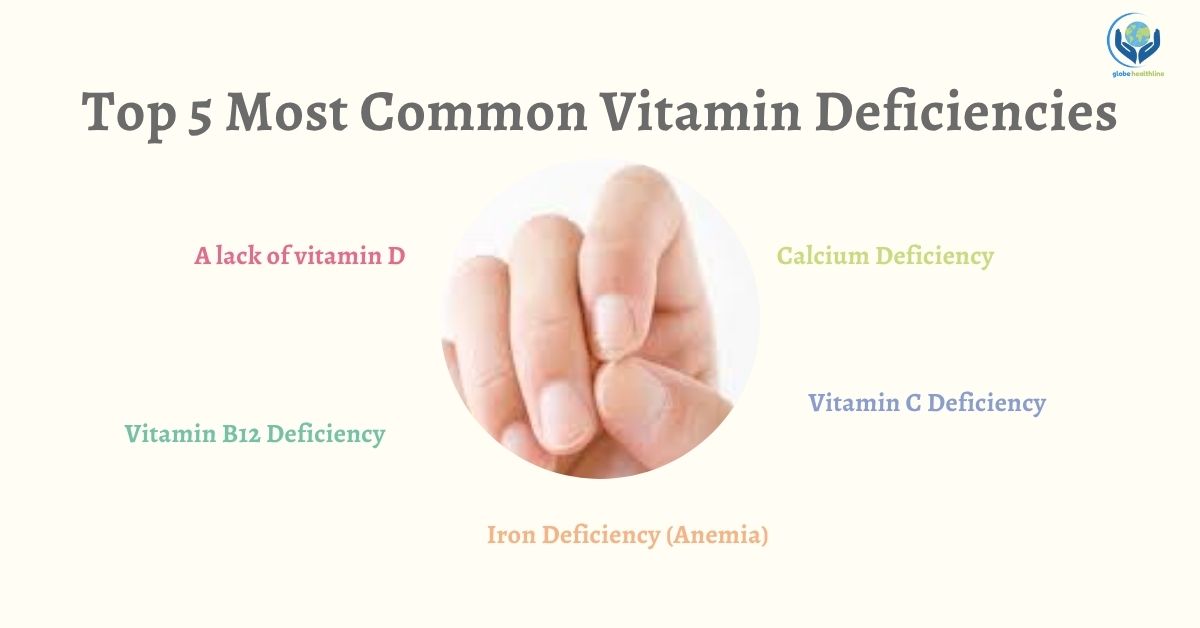Top 5 Most Common Vitamin Deficiencies in the U.S. and How to Fix Them Naturally

What is Vitamin Deficiency?
When the body does not function properly, a vitamin deficiencies sets in. In the US and around the world, where we have access to fast food and a sedentary lifestyle is popular, certain vitamin deficiencies have become very common, even in seemingly healthy people.
Recent findings suggest that over 92% of Americans are deficient in at least one vitamin or mineral, which can often be an issue as it can silently impact energy levels, immunity, skin health, and, perhaps most importantly, mental concentration.
So let’s know about the top 5 common vitamin deficiencies in 2025 and how to cure them naturally.
1. A lack of vitamin D
Why It Is Important:
Immune system strength, emotional management, and bone health are all supported by vitamin D. Fatigue, bone discomfort, and even melancholy might result from its absence.
Who is at Risk:
- People living in northern states
- Office workers who get little sunlight
- Darker-skinned individuals (lower natural synthesis)
Symptoms:
- Frequent illness
- Back pain
- Low mood or seasonal depression
- Muscle weakness
Natural Fixes:
- Sunlight: 15–20 mins a day
- Foods: Salmon, egg yolks, fortified milk
- Mushrooms exposed to UV light
2. Vitamin B12 Deficiency
Why It Matters:
Vital for brain health, energy production, and red blood cell formation. A lack of B12 can cause neurological symptoms and extreme tiredness.
Who’s at Risk:
- Vegans and vegetarians
- Older adults (less absorption with age)
- People with digestive issues (IBS, celiac)
Symptoms:
- Tingling in hands or feet
- Memory problems
- Fatigue
- Pale skin
Natural Fixes:
- Foods: Eggs, dairy, fortified cereals
- Supplements: Methylcobalamin tablets or shots (doctor’s recommendation)
3. Iron Deficiency (Anemia)
Why It Matters:
Iron is essential for hemoglobin, which helps transport oxygen throughout your body. Vitamin Deficiencies causes fatigue, pale skin, and brain fog.
Who’s at Risk:
- Women (especially during menstruation)
- Pregnant women
- Blood donors
Symptoms:
- Shortness of breath
- Weakness
- Dizziness
- Cold hands and feet
Natural Fixes:
- Foods: Spinach, tofu, lentils, pumpkin seeds
- Tip: Pair iron-rich foods with Vitamin C (like oranges) to boost absorption
4. Vitamin C Deficiency
Why It Matters:
Collagen synthesis, skin regeneration, and immunity are all aided by vitamin C. Additionally, it is an antioxidant that aids in the battle against illness and aging.
Who’s at Risk:
- Smokers
- People with poor diets (low fruit/vegetable intake)
- Heavy drinkers
Symptoms:
- Easy bruising
- Slow wound healing
- Bleeding gums
- Frequent colds
Natural Fixes:
- Foods: Oranges, bell peppers, kiwi, strawberries
- Drink fresh citrus juice regularly
5. Calcium Deficiency
Why It Matters:
Crucial for strong bones, teeth, muscle function, and heart rhythm.
Who’s at Risk:
- Postmenopausal women
- Lactose-intolerant individuals
- People on high-sodium or caffeine-heavy diets
Symptoms:
- Muscle cramps
- Brittle nails
- Numbness or tingling
- Osteopenia or osteoporosis (long-term)
Natural Fixes:
- Foods: Milk, cheese, broccoli, almonds, tofu
- Consider fortified plant-based milks if vegan
When to See a Doctor?
If you’re experiencing persistent fatigue, weakness, or unusual symptoms don’t guess. Ask your doctor for a simple blood panel test to identify deficiencies.
Frequently Asked Questions (FAQs)
Q1. Can vitamin deficiencies cause hair loss?
Yes, especially Vitamin D, B12, and iron deficiency are linked to hair thinning or loss.
Q2. Can I take multivitamins instead?
Multivitamins help, but aren’t a substitute for a nutritious diet. It’s best to get most nutrients from real food.
Q3. How long does it take to fix a deficiency?
Mild deficiencies may improve in 2–6 weeks with a proper diet. Severe cases may need supplements prescribed by a doctor.
Q4. Are vitamin deficiencies common in kids?
Yes, especially Vitamin D and iron. Balanced school meals and outdoor play are key preventions.
Conclusion:
In 2025, vitamin deficiencies are more common than ever, but they’re also more preventable than ever. By understanding the signs early and making small diet changes, you can drastically improve your energy, immunity, and overall health.

